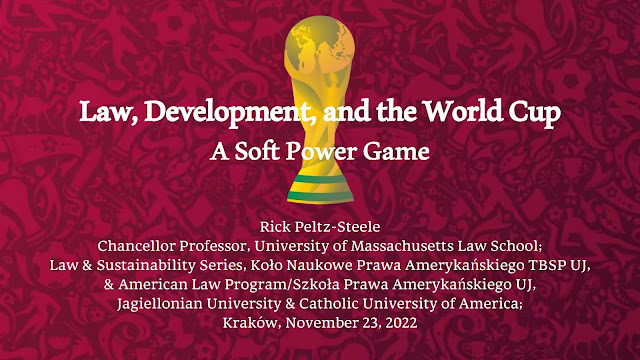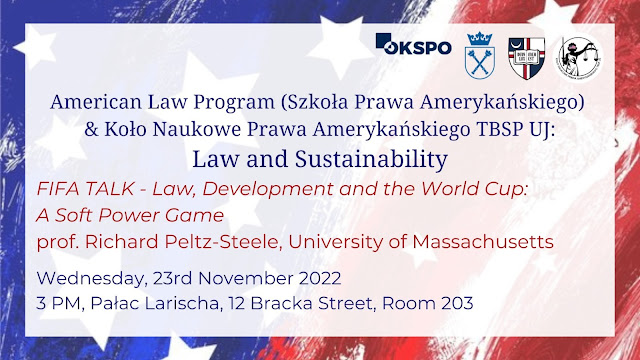Students and faculty of the American Law Scientific Circle (KNPA) and American Law Program at Jagiellonian University (Koło Naukowe Prawa Amerykańskiego TBSP UJ and Szkoła Prawa Amerykańskiego UJ), in collaboration with the Columbus Law School at the Catholic University of America, generously hosted me. The talk kicked off a KNPA lecture series on "Law and Sustainability." My especial thanks to KNPA President Zuzanna Maszniew and her leadership team.
 |
| Photo © Zuzanna Maszniew, used with permission. |
Today, November 29, the United States will round out its play in the group stage in Qatar with a match against Iran, simultaneously with a high stakes stand-off between England and Wales. It's a big day, football fans.
Meanwhile, coming home to the States this week, I've been disappointed that Americans are not more in tune with the fascinating stories of geopolitics that are unfolding under the sporting tents of the Qatar World Cup. I admit, what's happening now in China dangles meritorious distraction. But with the USMNT facing Iran today, I want to mention one of the stories from Qatar that has gripped me.
In Iran's opening match with England last week, Iranian footballers refused to sing their own national anthem (BBC). Stony faced, the players apparently chose to stand in silent solidarity with rights protestors against the government at home (N.Y. Times). Subsequently, Iranian authorities arrested a former national-team footballer known for occasional anti-regime sentiments (Guardian). At Iran's second match, the lads toed the line.
The anthem stunt was extraordinarily courageous. The players had to have known the disgrace they brought on the regime would have consequences when they go home, if not sooner.
 |
| Iranian footballers in 2018. Mahdi Zare/Fars News Agency via Wikimedia Commons CC BY 4.0 |
I'm a reasonably bright person, as people go, and I've seen a lot of the world. I come from an immigrant family myself. I grew up with a dear Iranian friend. Her stepmother taught me how to make tahchin, and her dad eagerly gave me his own well worn copy of All the Shah's Men. I shouldn't need to be reminded that people are just people, much the same around the world, just trying to make the best of things and find some joy where we can; and that it's wrong to ascribe the Machiavellian motives of states, whether others or our own, to their citizens. The protests now in China say the same.
Yet, I admit, I had followed the USMNT into the World Cup with something of a Cold War mentality, maybe because of the era when I grew up. Yellow ribbons, burning effigies, and "Death to America" chants all bounce around my long-term memory. I was determined that we and our Group B compatriots from England and Wales should beat Iran to make some kind of political point. A Miracle on Ice or Rocky IV situation.
The Iranian men's demonstration unsettled my unconscious prejudice. As a result, a part of me has been pulling for Iran in their last matches, even while, still, I had to favor the England squad, which features some of my beloved Manchester City stars, and Wales, which invokes Lasso-esque Wrexham affections. And even while, of course, I support my home USMNT today, there will be a part of me that wants to see the Iranian side make a pride-worthy showing.







